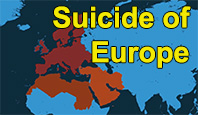The Islamic moral economy, Neoliberalism, and Eurabia - some pieces of the European suicide puzzle
A very interesting article assembles some of pieces of Europe's puzzling suicide via mass immigration: Islam Academic: Migrants Want Eurabia, Globalists Using Migrants to Destroy The West, Breitbart, August 14, 2016.
The essence of the article is that:
The Moroccan academic, who works in countries across Europe, stated that Muslim migrants view "all property as 'given' and not 'acquired' by work." Professor Belhaj revealed that Muslims, therefore, believe that by taking Europe's land, Muslims will be granted wealth...
The professor disclosed that "state law has no weight compared to the law of God", for Muslims, and so they establish parallel societies in Europe.
This state of affairs is perfect for neoliberalism, Professor Belhaj argued, as Muslim zones in European states "disrupt social cohesion and peripheralise societies"
(Neoliberalism currently refers to market-oriented policies such as deregulating capital markets, eliminating price controls, lowering trade barriers, and reducing state influence on the economy - especially through privatization and austerity. This new meaning of neoliberalism is common among Spanish-speaking scholars, but the term is used less frequently in the United States.)
Digging deeper, this is an interview with the academic Belhaj referenced in the Breitbart article. It presents a fascinating - and disconcerting - perspective.
Mutual benefits: Islamic moral economy and Neo-Liberalism - An interview with Abdessamad Belhaj by Bianka Speidl, Migrációkutató, August 2, 2016.
A few excerpts:
...Islamic moral economy relies on religious and economic premises that are closely interconnected. To put it briefly: Islamic moral economy believes that if there is money, it is because of Islam, and if there is Islam it will bring money because of the constant redistribution of the goods. In Islam, all property belongs to God, and when he gives it to people, he expects a deal: that of spending it in "the way of Allah". Islamic law urges to use every property in the service of religion. Property is regulated by sharia, the only valid law from an Islamic point of view. The faithful considers all property as "given" and not "acquired" by work...
...Migration is useful for the neo-liberal model of the borderless, minimal, global society, but is calamitous for the European citizens as a whole. The millions of migrants neoliberalism welcomes appear as a cheap work force; it believes that the expenses spent on them will pay back by lower salaries, etc.. In the meantime, European citizens get poorer since average wages are decreasing, and unemployment is on the rise. The logic of neoliberalism only looks at the profit it could get from Muslim migration. It does not want to see that Muslim migration has its own moral economy, and that this moral economy is a deadlock...
...Neoliberals underestimate three threats and consider them as collateral damages. First, that Islamic moral economy leads to bankruptcy and collapsed societies. Second, that jihadism is inseparable from the Islamic moral economy, and indeed a sign that it needs violence to sustain its existence or to expand further its boundaries. Third, that a reaction of European citizens to Islamic radical violence might lead to disintegration. Neoliberalism overlooks these risks and surrenders to the promises of Islamic moral economy such as Islamic finance, sustained by a global flux of money from East Asia to the US, cheap work force and population growth...
In summary, neoliberals stand to profit from the mass influx of Muslim immigrants into Europe in two ways: it potentially increases the labor pool and consumer base, and it diminishes the power of those who want to preserve the nation-state. Yet the Islamic moral economy is diametrically opposed to western capitalism. Indeed, the entire social fabric of Islam is diametrically opposed to western European civilization. The end result will be an impoverished Europe enmeshed in a permanent conflict of culture and economies.
In the last sentence of the interview, Belhaj posits fleeting hope that Muslims in Europe can be convinced to change their ways. Yet as Belhaj himself notes, "jihadism is inseparable from the Islamic moral economy."
Related

